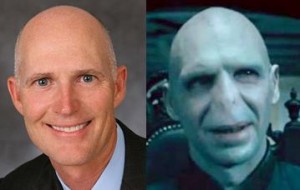The SCOTUS Healthcare Decision Cometh
[UPDATE:Okay, from the SCOTUSBlog “The entire ACA is upheld, with exception that federal government’s power to terminate states’ Medicaid funds is narrowly read.” Key language from the decision on the mandate:
The money quote from the section on the mandate: Our precedent demonstrates that Congress had the power to impose the exaction in Section 5000A under the taxing power, and that Section 5000A need not be read to do more than impose a tax. This is sufficient to sustain it.
And, boy howdy, was I wrong. I steadfastly maintained that CJ Roberts would never be the swing vote on a 5-4 majority, but would only join a liberal majority on the heels of Tony Kennedy. WRONG! The mandate survives solely as a result of Roberts and without Kennedy. Wow.
Final update thought. While I think the mandate should have been constructed as a tax, it clearly was not in the bill passed. You want to talk about “legislating from the bench”? Well hard to see how this is not a remarkable example of just that. I am sure all the plebes will hypocritically cheer that, and fail to note what is going on. Also, if the thing is a “tax” how is it not precluded as unripe under the AIJA? don’t have a fine enough reading of the opinion – read no reading yet – to discern that apparent inconsistency.
As to the Medicaid portion, here is the key opinion language on that:
Nothing in our opinion precludes Congress from offering funds under the ACA to expand the availability of health care, and requiring that states accepting such funds comply with the conditions on their use. What Congress is not free to do is to penalize States that choose not to participate in that new program by taking away their existing Medicaid funding.
Oh well, people on the left have been crying for this crappy law, now you got it. Enjoy. I will link the actual opinion as soon as it is available.
And here is THE FULL OPINION]
Well, the long awaited moment is here: Decision Day On The ACA. If you want to follow the live roll out of the Supreme Courts decisions, here is a link to the incredibly good SCOTUSBlog live coverage. Coverage starts at 9 am EST and the actual Court proceedings starting at 10 am EST.
This post will serve two functions. The first is to lay just a very brief marker, for better or worse (undoubtedly the latter I am afraid), going into decision day, hour and moment, and a ready location to post the decision of the court and link the actual opinions. The minute they are known and links available, they will be put here in an update at the top of the post. That way you can start the discussion ahead of the decisions, lay a record of your predictions ahead of time AND have a place to immediately discuss the rulings as they come in and immediately afterward.
Many friends and other pundits involved in the healthcare SCOTUS discussion have been working for weeks on alternative drafts of posts and articles to cover every contingency so they can immediately hit the net with their takes. That is great, and some of them will be a service. But I have just been too busy lately to expend that kind of energy on something so canned. Sorry about that. So my actual analysis and thoughts will mostly have to come later, but they will be on the merits, such as they may be, when the actual decisions are in. Also, I will be in comments and on Twitter (under “bmaz” of course).
Okay, with the logistics out of the way, I have just a few comments to lodge on the front end of this gig. First off, the ACA/PPA started off as truly about health insurance, not about health care from the start, and that is, still, never more true than today. Marcy laid out why this is, and why a LOT of people may get, or be forced into, purchasing health insurance, but there is a real question as to whether they will be able to afford to actually use what they will be commanded to buy. See here, here and here as a primer. Those points are pretty much as valid today as they were back when she wrote them.
Secondly, I have no real actual idea how the ruling will come down as to the merits. But, just for sport and grins, I guess I should take a stab at what I think after all the briefing and oral arguments, so here goes. The Anti-Injunction Act argument that the issue is a tax matter and therefore cannot be ripe for consideration until implemented and applied, will be rejected. The individual mandate is struck by a very narrow majority in a very carefully worded opinion written by John Roberts. The remainder of the ACA is deemed severable and is left to stand, and the Medicaid provisions are left intact, again by a narrow majority. Here is the thing, I would not bet one red cent of my own money on the foregoing; but if I could play with your money, I guess that is how I would roll. Maybe. Note that, before oral argument, my prediction was that the mandate would be upheld; I may regret not sticking with that call.
The real $64,000 question is the mandate, and that could just as easily be upheld, in which case it will likely be by a 6-3 margin (I still think Roberts writes the opinion, and if that is to uphold that means it will be 6-3). Here is what I will unequivocally say: however this goes down as to the mandate, it is a very legitimate issue; the arguments by the challengers, led by Randy Barnett, are now, and always were, far more cognizant than most everyone on the left believed or let on. I said that before oral argument, I said that after oral arguments and I say that now. Irrespective of what the actual decision turns out to be. Oh, and I always thought the hook liberals desperately cling to, Wickard v. Filburn, was a lousy decision to start with.
I have been literally stunned by the ridiculous hyperbole that has been blithely bandied about on the left on the ACA cases and potential striking of the mandate. Kevin Drum says it would be “ridiculous”, James Fallows says it would be a “coup!”, Liz Wydra says the entire legitimacy of SCOTUS is at issue, So do the Jonathans, Chait and Cohn. A normally very sane and brilliant guy, Professor David Dow, went off the deep end and says the justices should be impeached if they invalidate the mandate. The Huffington Post, and their supposed healthcare expert, Jeffrey Young, ran this insanely idiotic and insulting graphic. It is all some of the most stupefyingly hyperbolic and apoplectic rubbish I have ever seen in my life.
Curiously, the ones who are screaming about, and decrying,”politicization of the Court”, my colleagues on the left, are the ones who are actually doing it with these antics. Just stop. Please. The mandate, and really much of the ACA was ill conceived and crafted from the get go. Even if the mandate is struck, the rest of the law can live on quite nicely. Whatever the decision of the court, it will be a legitimate decision on an extremely important and very novel extension of Commerce Clause power that had never been encountered before.
One last prediction: Irrespective of the outcome today, the hyperbole will continue. So, there is the warm up. Let’s Get Ready To Rumble!





